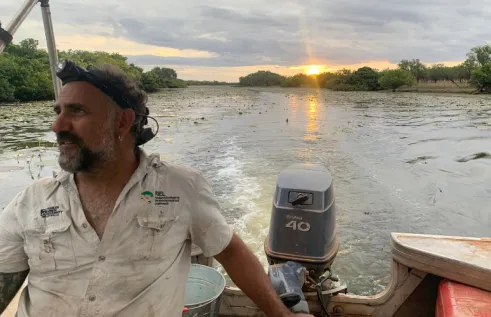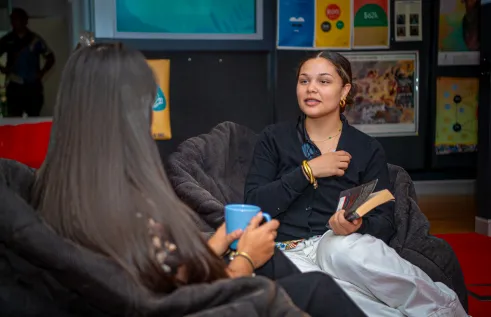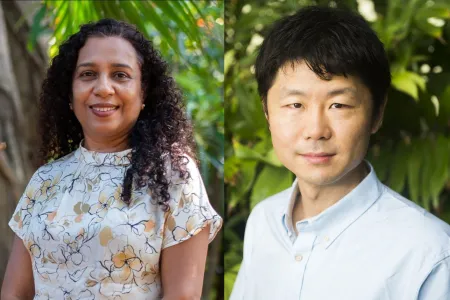RIEL seminar series
Sniffing out citrus canker and beyond
| Presenter | Dr Vinuthaa Murthy and Dr Hao Wang | |
|---|---|---|
| Date/Time |
to
|
|
| Contact person | E: riel.outreach@cdu.edu.au | |
| Location | CDU Casuarina Campus Yellow 1.1.39 and online | |
| Open to | Public | |
The Northern Territory’s citrus industry came under attack in 2018 from a highly contagious bacterial disease called citrus canker. Citrus canker is a highly infectious bacterial disease caused by the bacterium Xanthomonas citri subsp. citri (Xcc). Severe infection can lead to defoliation, dieback, blemished fruit, and premature fruit drop.
CDU chemists, Dr Hao Wang and Dr Vinuthaa Murthy won a contract with the Department of Industry, Tourism and Trade (DITT) in 2020 to develop a scent profile and synthesise artificial scent lures for the detection of citrus canker disease.
The project set out to determine the volatile organic compound (VOC) profile of the infected citrus plants at the CDU, Yellow 2 labs using the gas chromatography-mass spectrometer (GC/MS). Key chemical compounds emitted by different citrus varieties, both infected and non-infected, were identified over time. Artificial scent blends (lures) were synthesised based on the VOC profile and provided to DITT. Two sniffer dogs are now trained with the artificial lure to detect the citrus canker-infected plants.
This presentation will also provide an overview of the analytical chemistry instrumentation available at CDU, Yellow 2 labs for identifying and quantifying the chemical components of natural and synthetic materials.
Dr Vinuthaa Murthy is a Senior lecturer in Chemistry at the College of Engineering, IT & Environment and the current president of the Royal Australian Chemical Institute, NT branch. Her expertise is on applying Computational and Analytical Chemistry techniques to solve the structural properties of small molecule interaction with macromolecule surfaces. Currently her research focuses on characterisation of nanoparticles conjugated with native plant extracts with biomedical applications such as antimicrobial and wound healing and nano-systems used in water treatment to remove persistent contaminants.
Dr Hao Wang is a Senior Technical Officer managing the newly established analytical chemistry laboratory at Energy and Resources Institute, CEITE. Before joining CDU, He worked in the Global and Tropical Health Division of Menzies School of Health Research, studying malaria treatment and drug resistance. His expertise is in analysing small molecules using instrument with various chromatography and spectrometry techniques.
Related Events

STATE OF THE DIS-UNION: Media Literacy in the age of AI
The CDU Library is hosting a free panel discussion featuring Northern Territory journalists who will discuss media literacy, truth, and storytelling in the AI era. Attendees can learn how AI is transforming media, ask questions, and improve their understanding of navigating information in today's landscape.
Read more about STATE OF THE DIS-UNION: Media Literacy in the age of AI
Trophic dynamics of free-flowing tropical rivers
Colton Perna's PhD research explores how river flows and flooding shape freshwater fish communities in tropical rivers, using fatty acids to track how hydrology influences food webs and nutritional pathways. His findings highlight the critical importance of river flow and floodplain connectivity in sustaining productive aquatic ecosystems.
Read more about Trophic dynamics of free-flowing tropical rivers
Why Cross‑Cultural Communication Matters in Indigenous-focused Research
A cross‑cultural research partnership grounded in respect, shared knowledge, and educational equity. Discover how collaboration shaped a transformative PhD journey.
Read more about Why Cross‑Cultural Communication Matters in Indigenous-focused Research
